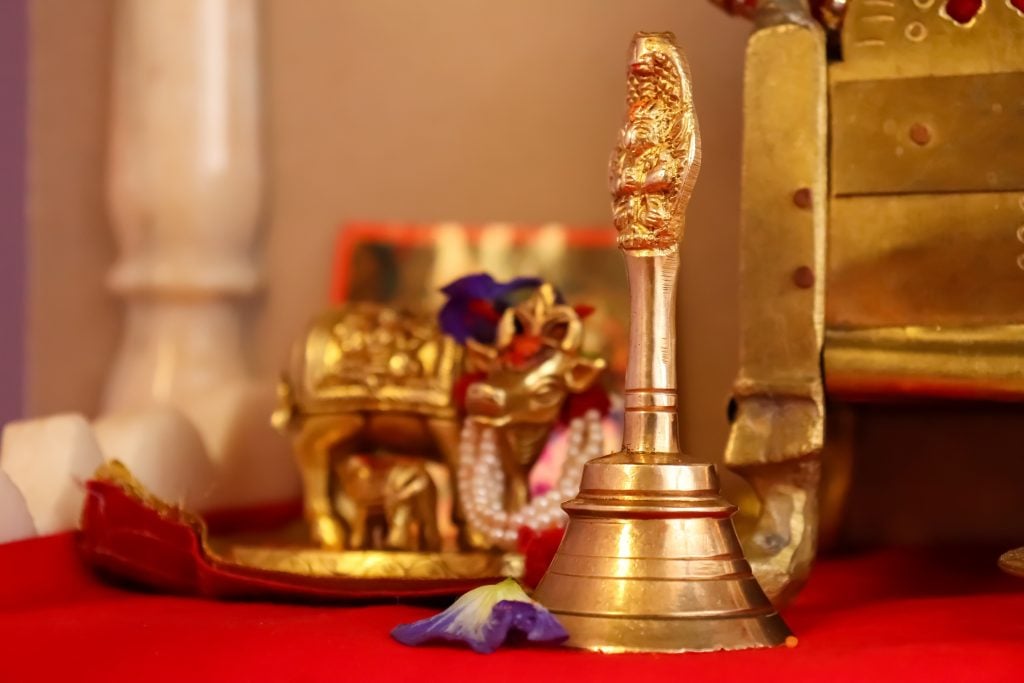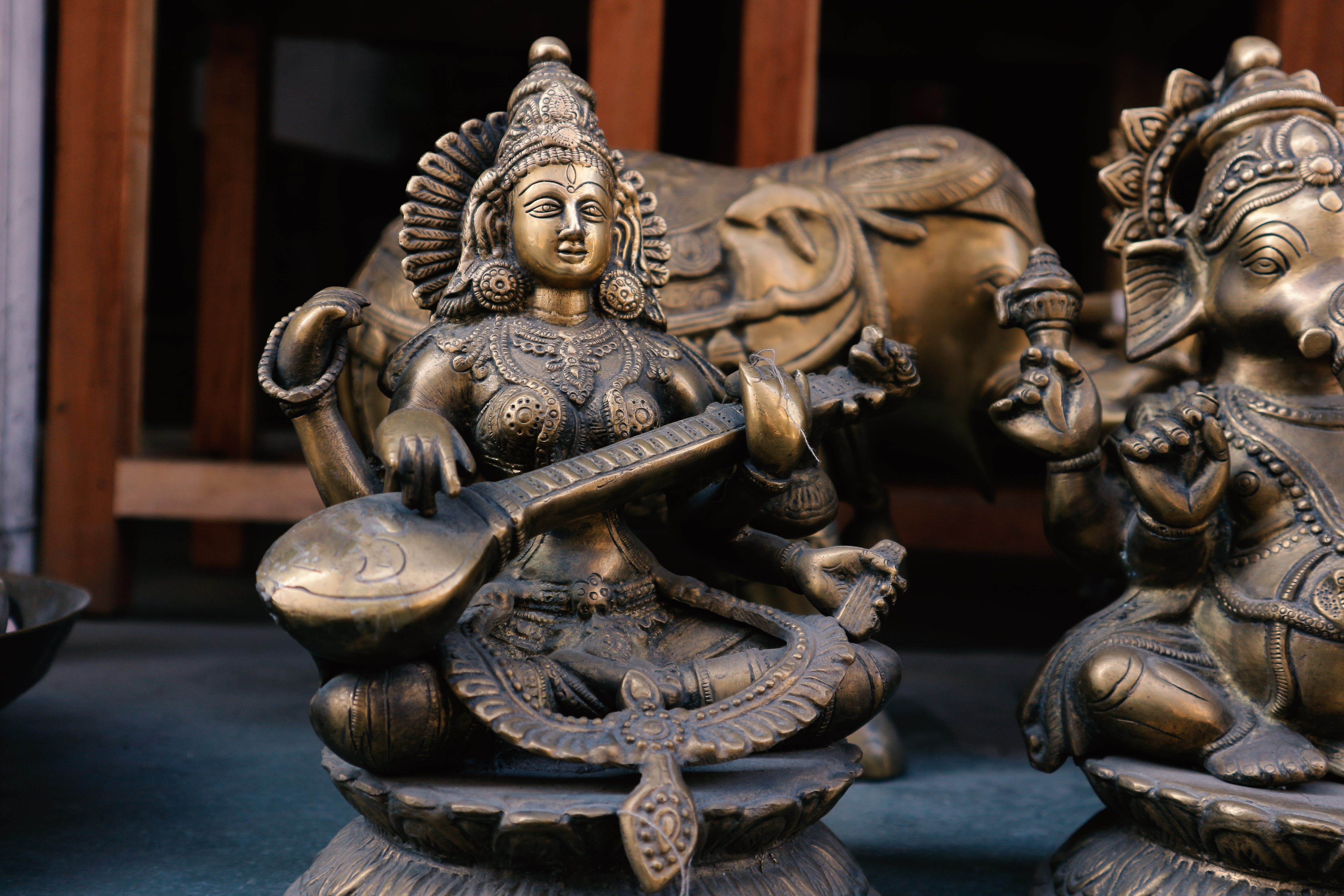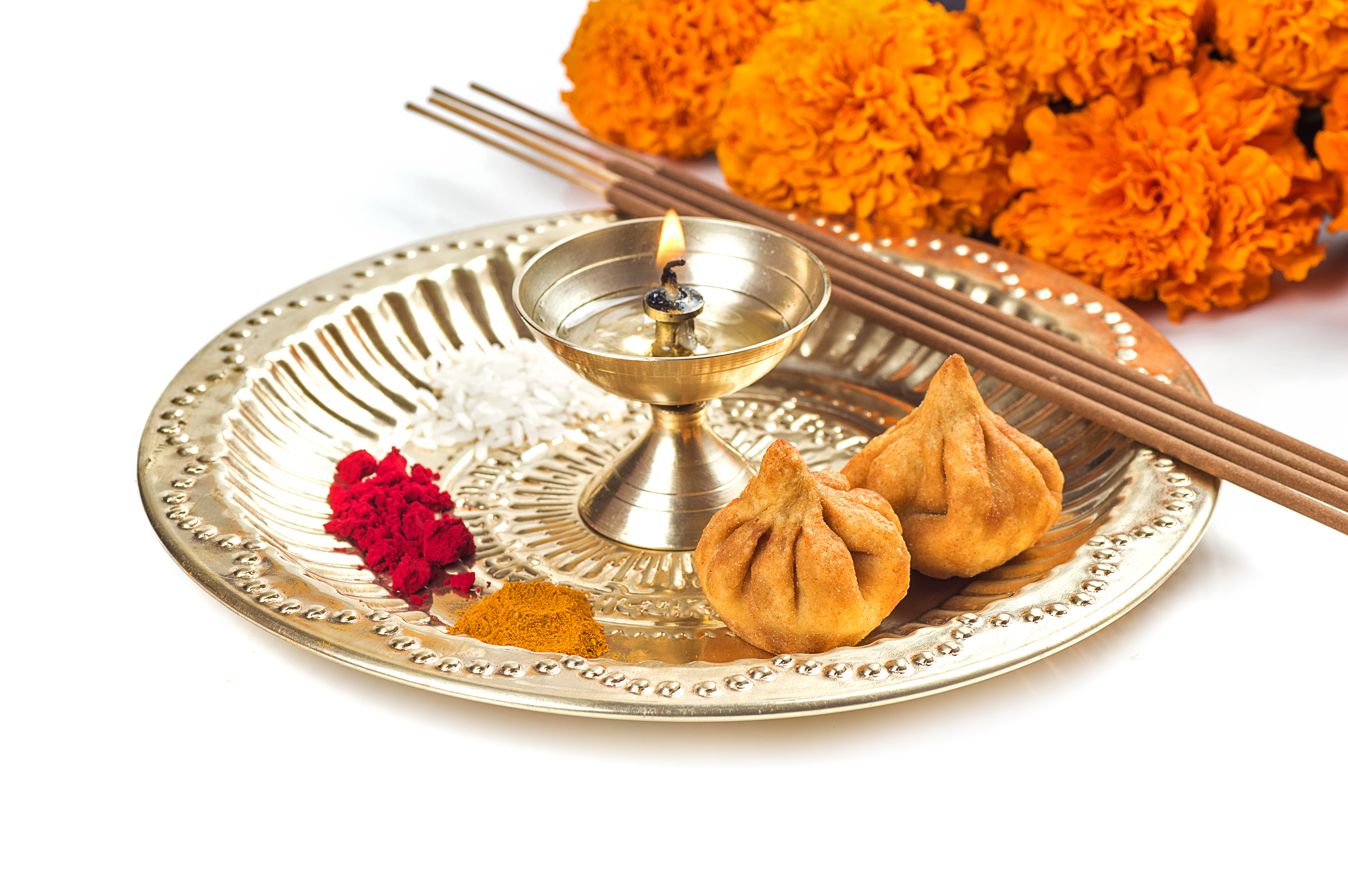For the devout among us, the Pooja room is the centre of our homes. Each morning starts with cleaning out the Pooja room and decorating it before lighting the lamp, and the same ritual is carried out in the evening too. Keeping this sacred space clean is not an easy task; it takes a lot of effort and care to clean out all the oil, smoke from agarbathis and dried flowers and keep all your Pooja items gleaming. Our tips will help you keep your Pooja room clean and sparkling, with minimal effort.
1. How to Clean the Brassware
We have many brass idols and statuettes in the pooja room. In most South Indian homes, the lamps, bells and Pooja utensils are also made out of brass. These lamps tend to get very sticky and grimy with oil at the end of the day. Brass also tends to oxidise and forms a dull patina on the surface. Here are some easy ways to clean your brassware:
- Soak the items in a bucket of hot water with a spoonful of detergent for ten minutes.
- Use a metal scrubber and dish wash soap (use a brand that contains lime) to scrub out all the oil. Lather it well and scrub as vigorously as you can, several times.
- Rinse in warm water.
- Take a lime-sized ball of tamarind and soak it in water. Use this to scrub the brass item again.
- Rinse again in warm water.
- If it is still sticky or not clean enough, use some damp soil to scrub the surface again.
- Wash in cold water and pat dry. Your brass items will be shining.
2. How to Clean Silverware Pooja Items
Many Pooja items are made of silver – lamps, receptacles for sacred ash, bells, and so on. Like brass, silver also gets tarnished and becomes dark, losing its surface shine. You can make it look new in just a few easy steps:
- Sacred ash, or vibhuti, can be used to restore the shine to your silver. Make a paste out of the ash and apply it to the silver surface.
- Scrub very well with your hands; do not use a scrubber as silver is soft and can get scratched.
- Use a thin, soft muslin cloth to wipe it down and remove the vibhuti paste.
- If you don’t have vibhuti, the ash from the burning of agarbathis can also work well.
- Tomato ketchup or toothpaste are also surprising fixes to clean tarnished silver! Use a clean toothbrush with soft bristles to rub toothpaste or ketchup on the surface, and wash it thoroughly when done.
- Very dirty silverware can be deep cleaned by boiling it in a large pot of water. Add a tablespoon of baking powder, along with a small piece of aluminum foil. For some reason, this combination seems to work wonders.
3. How to Clean Copper Pooja Items
If copper idols are exposed to water or even air, they can get discolored and black spots will form on the surface. Here are some tips to keep your copper items looking their best:
- Make a 50:50 paste of table salt and vinegar. Stir till it is smooth.
- Use a clean towel and dip in the paste. A slightly rough cloth works best.
- Rub the cloth with the paste on the copper surface and use circular motions till you cover the entire surface.
- Keep using more paste; be as generous as you can.
- If the surface has many indentations, use a clean toothbrush and make sure you reach all the crevices.
- Rinse in lukewarm water and wipe dry with a clean towel.
- If the stains are adamant, instead of making a paste, you should make a solution with vinegar and salt, and boil your copper items in the solution for up to 15 minutes.
- Leave the solution to cool, and then wipe your copper items dry.
4. How to Clean the Pooja Counter
The pooja counter is commonly a stone surface like marble or granite but could be made of wood too. Oil spills, agarbathi ash and dried flowers must be cleaned regularly. Remember that dust will quickly accumulate on any oil that is not cleaned regularly, and you don’t want your Pooja room looking dirty. Wipe clean at the end of every day with a detergent spray and warm water. Wipe again with a dry cloth so that there are no spots on the surface.
5. How to Clean the Doors
Pooja room doors often have intricate wooden jali work and small bells. Clean the bells using the steps described above. The woodwork should preferably be only dusted or vacuumed, as wiping with oil or water often will make the surface difficult to varnish in the future. If your woodwork is protected with a melamine spray, then just regular dry dusting will suffice to keep the surface clean.
6. How to Clean the Floor
Vitrified tiles or granite can be cleaned just like regular floors, and wet mopping daily will keep them clean. Marble floors need to be treated with care as marble is porous and will get damaged if any acidic substances fall on it. Haldi, kumkum and oil spills must be wiped at once with lukewarm soapy water. Never use lime or baking soda on marble, as it will cause holes and discolour the surface.
7. How to Clean the Walls
In a small closed space when you light a lamp daily, the walls can get affected by the oil fumes and smoke. If your pooja room walls are covered in tiles or stone, they can be wiped down regularly with soapy water to keep them clean. If the walls are painted, make sure that the paint used is a plastic emulsion which can also be wiped once in a while. Make sure that you repaint the walls every year to keep them looking new.
8. How to Clean Pooja Cloths
The idols in your Pooja may be clad in sacred cloth or silks. If they can be removed, wash them as appropriate; cotton cloths must be hand washed with similar colours, and silks must be dry cleaned. Change the materials once a year or as frequently as you wish to keep your pooja room looking immaculate. Any cloth that has delicate tassels or gold fringes may get damaged if washed or dry cleaned; so replace them when they look worn out instead.
9. How to Clean Framed Pictures
In addition to the idols in your pooja room, you may have images of deities on the wall as well. Remember that oil fumes can make the surfaces of these framed pictures very sticky. Make sure that you take them down once in a couple of weeks and wipe them clean with a glass cleaner spray. Don’t forget to do this regularly, as once the grime builds up on pictures they can get ruined beyond repair.
10. How to Declutter the Pooja Items
It’s easy to let clutter build up even in a small space like your pooja room. We often bring home Prasad from temples, packets of kumkum and so on and leave them in the pooja room. These packets tend to lie around in the corners of the room for days. Take care to declutter the storage space regularly- throw away empty containers of agarbathis, used matchsticks, and so on.
What did you think of these tips? Is there anything else you do to keep your Pooja room gleaming? Tell us in the comments below.







